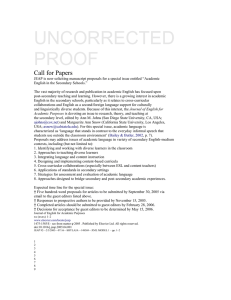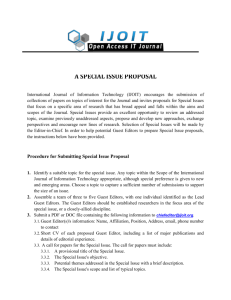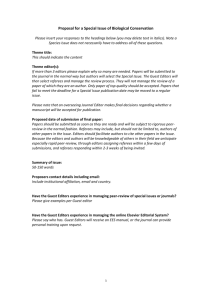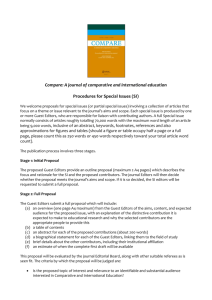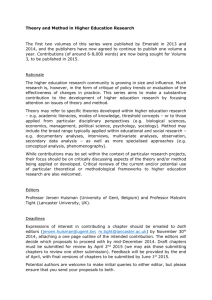Global Environmental Change Guidelines for Special
advertisement
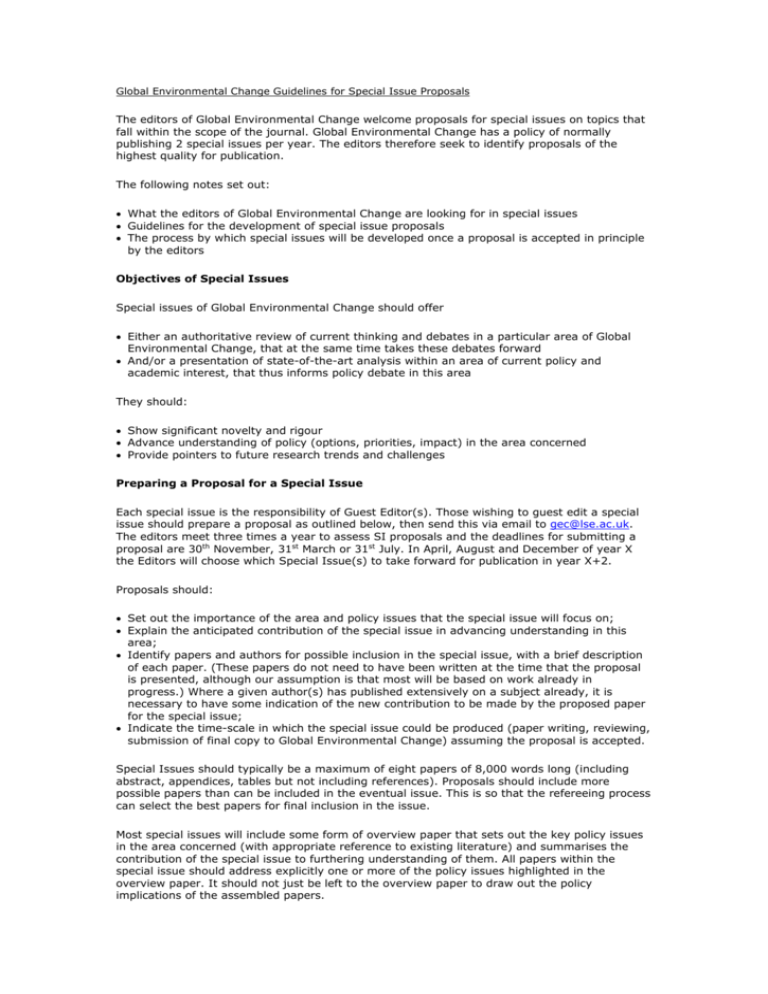
Global Environmental Change Guidelines for Special Issue Proposals The editors of Global Environmental Change welcome proposals for special issues on topics that fall within the scope of the journal. Global Environmental Change has a policy of normally publishing 2 special issues per year. The editors therefore seek to identify proposals of the highest quality for publication. The following notes set out: What the editors of Global Environmental Change are looking for in special issues Guidelines for the development of special issue proposals The process by which special issues will be developed once a proposal is accepted in principle by the editors Objectives of Special Issues Special issues of Global Environmental Change should offer Either an authoritative review of current thinking and debates in a particular area of Global Environmental Change, that at the same time takes these debates forward And/or a presentation of state-of-the-art analysis within an area of current policy and academic interest, that thus informs policy debate in this area They should: Show significant novelty and rigour Advance understanding of policy (options, priorities, impact) in the area concerned Provide pointers to future research trends and challenges Preparing a Proposal for a Special Issue Each special issue is the responsibility of Guest Editor(s). Those wishing to guest edit a special issue should prepare a proposal as outlined below, then send this via email to gec@lse.ac.uk. The editors meet three times a year to assess SI proposals and the deadlines for submitting a proposal are 30th November, 31st March or 31st July. In April, August and December of year X the Editors will choose which Special Issue(s) to take forward for publication in year X+2. Proposals should: Set out the importance of the area and policy issues that the special issue will focus on; Explain the anticipated contribution of the special issue in advancing understanding in this area; Identify papers and authors for possible inclusion in the special issue, with a brief description of each paper. (These papers do not need to have been written at the time that the proposal is presented, although our assumption is that most will be based on work already in progress.) Where a given author(s) has published extensively on a subject already, it is necessary to have some indication of the new contribution to be made by the proposed paper for the special issue; Indicate the time-scale in which the special issue could be produced (paper writing, reviewing, submission of final copy to Global Environmental Change) assuming the proposal is accepted. Special Issues should typically be a maximum of eight papers of 8,000 words long (including abstract, appendices, tables but not including references). Proposals should include more possible papers than can be included in the eventual issue. This is so that the refereeing process can select the best papers for final inclusion in the issue. Most special issues will include some form of overview paper that sets out the key policy issues in the area concerned (with appropriate reference to existing literature) and summarises the contribution of the special issue to furthering understanding of them. All papers within the special issue should address explicitly one or more of the policy issues highlighted in the overview paper. It should not just be left to the overview paper to draw out the policy implications of the assembled papers. GEC also accept proposals for mini-Special issues typically consisting of 3-4 manuscripts and an overview paper – with the same guidelines on length, etc as detailed above. To assist the editors in understanding how the papers in the proposal would contribute to a coherent special issue, the proposal should include a matrix that: Lists the key policy issues that the special issue intends to address Shows which papers will contribute to our understanding of which policy issues This matrix can also act as a useful tool during the preparation of a special issue, by showing authors the overall context of the issue and how their paper is supposed to contribute to this. Editing a “Successful” Special Issue Once a proposal has been approved in principle by the editors of Global Environmental Change, it is the responsibility of the Guest Editors to manage the review process to deliver the issue within the agreed time-scale. One Guest Editor will be given editorial responsibilities on Elsevier’s Electronic Submission system (http://ees.elsevier.com/gec/) through which they will manage the review process. Special Issue authors submit their manuscripts to the online system where the guest editor is responsible for organizing a double-blind reviewing process for all papers submitted for inclusion in the special issue, so as to: Identify those papers to be finally included in the special issue Strengthen these papers, so as to ensure the highest possible standards for the issue Authors resubmitting their manuscript following revision are required to submit a letter outlining their response to each of reviewer comment. Depending on the scale of the revisions the Guest Editor will then choose to send the manuscript out for re-review, accept, or reject the manuscript. Further rounds of revision may be required. Guest Editors should keep the editors of Global Environmental Change informed by e-mail of progress in preparing the special issue and in particular alert them in advance if agreed deadlines are likely to slip. The editors of Global Environmental Change will check the quality of the manuscripts within the issue before forwarding it to Elsevier for publication. They reserve the right to request an additional review of papers and, if necessary, to request modifications to an issue before approving it for publication. However, the procedures set out above are designed to minimize the need for such measures.
